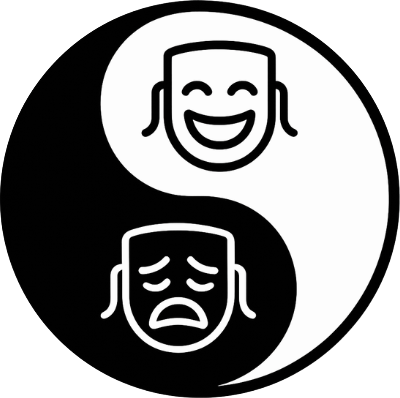The Self-Compassionate Actor
Raise your hand if your actor self can relate to any of the following:
- Engaging in "a range of self-critical cognitions and behaviours".[1]
- Exposure to "high levels of [...] evaluation and critical assessment".[2]
- Existing "within high pressure competitive and often hostile or critical environments".[3]
- Experiencing frequent "setbacks, disappointments, and failures".[4]
- External expectations of "body weight and shape."[5]
- "Financial difficulty and job instability."[6]
- "Social media or audience abuse."[7]
🙋
In the words of the research teams behind these papers, "Performing artists face many difficult internal, interpersonal, and environmental stressors which can affect mental health".[8]
And further, "approaches to responding effectively to these difficulties are needed for performers".[9]
Is anyone else throwing an "amen" here?
If you're new to the Dojo, welcome! For TL;DR context, our overarching approach to "responding effectively to these difficulties" is actorfying evidence-informed practices from sport psychology. In this article, however, we're going to unpack a well-supported practice from psychology more broadly: self-compassion.
Backed by science; built for the stage and screen.
👊 Actors:
Get evidence-informed insights and strategies to support your performance and well-being. Join the Dojo e-newsletter tribe and make thriving your reality.
🧭 Drama schools & Production companies:
Bring pioneering, research-backed coaching into your classroom or rehearsal room. Let's talk about supporting your actors to perform at their peak – and stay well in the process.
Understanding self-compassion
Before y'all run away screaming, let me say I get it. My therapist would be the first to confirm my historic cringe response to this word. I've come some way (I have the best therapist 🙏), but I get it.
Having an accurate definition helped a bunch, so let's start there. At the Dojo, we draw on Dr Kristen Neff's: "self-compassion involves being touched by and open to one's own suffering [...] generating the desire to alleviate one's suffering and to heal oneself with kindness".[10]
In short, recognising our suffering and desiring to alleviate it. The emotional and psychological equivalent of recognising physical pain ("Ouch, a bee-sting!") and desiring to alleviate it ("Let's remove the stinger, clean the area, and apply a cold pack). When defined like this, self-compassion sounds kinda wise, no?
Research would suggest yes.
Not only has a scoping review revealed evidence of self-compassion leading to better athletic performance,[11] but also to better well-being, orientation toward excellence, and ability to rebound from setbacks.[12]
It's unsurprising, then, that researchers feel self-compassion could offer performers of all stripes an effective approach to responding to difficulties such as those we started with at the top.[13]
Cultivating self-compassion
Let's now look at some not-scary and not-too-cringe-worthy ways we can cultivate self-compassion.
First, watch this space: a team of Australian researchers is developing empirically supported self-compassion practices for performing artists.[14] Actors included, which is rare and very very exciting.[15] We'll be sure to flag to the tribe once this is live.
In the meantime, one of these researchers, psychologist Dr James Kirby, has made a series of zero-cost guided practices available online. His 15-minute compassionate self practice and 7-minute compassion for self practice are great introductions. Dr Kirby has also just launched an app, My Three Circles, available for free on iOS (Android incoming!). These are solid resources you can trust.
Targeting self-compassion with a licensed therapist is another strong option. For the days or seasons when this isn't accessible, however, journaling or voice noting ourself can offer some of the same catharsis. Dr Neff proposes that self-compassion consists of three components: mindfulness, self-kindness, and common humanity,[16] so a simple place to start might be reflecting on how we're relating to each.
- Mindfulness: How could I open to this reality more and judge it less?
- Self-kindness: How would I show kindness to a loved one in this situation, and how might I extend some of that kindness to myself?
- Common humanity: How could I acknowledge that difficulties are part of the human experience, and thus feel a little less alone?

The actor's path is hard enough to walk as it is. The least we can do is be our own friend along the way.
TL;DR?
No worries. Here are the three key takeaways:
- Performing artists, including us actors, face a range of domain-specific stressors which can affect our mental health.
- Self-compassion is a well-supported practice from clinical psychology that can help us better navigate these stressors.
- Self-compassion is something we can start cultivating today. And, soon, we'll even have evidence-based, performing artist-centric practices available 🙌
Love what you're reading? Help us keep it flowing. Donations support the research, writing, and free sharing of evidence-informed tools for actor performance and well-being. Every dollar fuels our mission to make thriving a reality for actors everywhere 🔥
Citations
[1] [3] https://doi.org/10.1080/00050067.2022.2033952, p. 77
[2] [5] [6] [7] [9] https://doi.org/10.1080/00050067.2022.2033952, p. 78
[4] https://doi.org/10.1080/00050067.2022.2033952, p. 80
[8] [13] https://doi.org/10.3389/fpsyg.2025.1512114, p. 16
[10] https://doi.org/10.1080/15298860309032, p. 87
[11] https://doi.org/10.1080/1750984X.2022.2161064, p. 180
[12] https://doi.org/10.1080/1750984X.2022.2161064, p. 172
[14] https://doi.org/10.3389/fpsyg.2025.1512114
[15] https://doi.org/10.1111/ap.12221, p. 78
[16] https://doi.org/10.1080/15298860309032, p. 89
Cite us!
IG: @theactorsdojo
APA 7: Norrish, T. (2025, October 24). The self-compassionate actor. The Actor’s Dojo. https://www.dojoactors.com/self-compassion/
